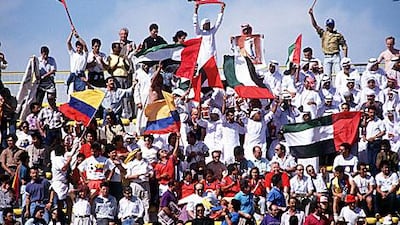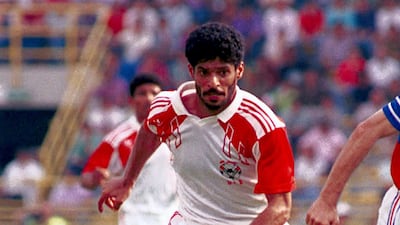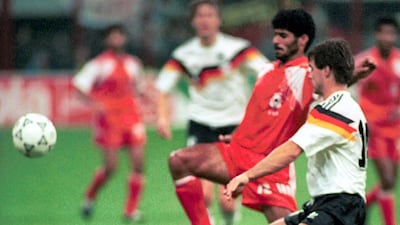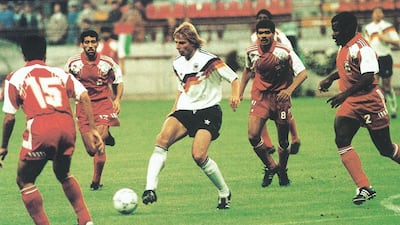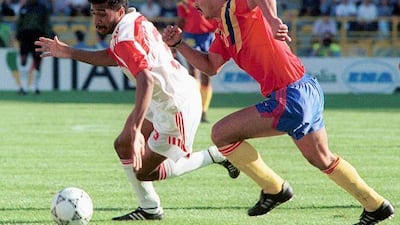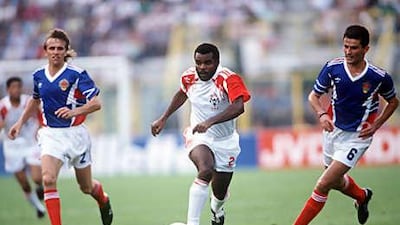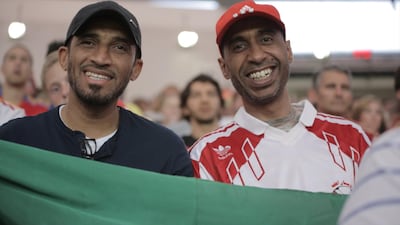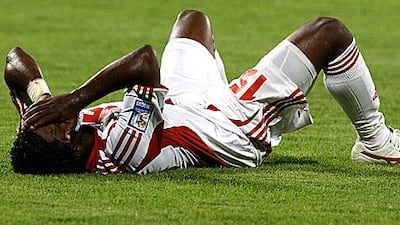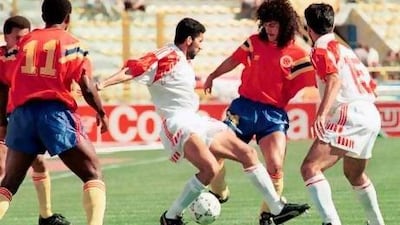Every day over three weeks, The National looks back at the 21 greatest moments in UAE sports history.
On October 28, 1989, on sodden Singapore turf and less than 18 years after the formation of their homeland, the UAE realised one of football’s great dreams.
They qualified for a Fifa World Cup.
So very close in 1986, the national team hauled themselves over the line three years later, coming through a six-team final qualifying round when almost no one expected it. It was even suggested Mario Zagallo’s team had travelled simply to fulfil contractual obligations.
But the UAE beat the odds. After four draws and a late, late win against China, they entered the final match, against group leaders South Korea, sat second. Behind them, the Chinese, North Korea and Qatar gunned for their spot.
It didn’t begin well at the Jurong Stadium. South Korea scored after eight minutes, but the UAE regrouped to equalise in the 16th minute through sharpshooter Adnan Al Talyani. As they clung on for point, and not long before the conclusion, word filtered through from across the island-city state that Qatar had defeated China. The UAE had done it; they had reached the World Cup.
Watching the players celebrate in the mud, Emirati commentator Adnan Hamad was caught up in the emotion.
“I can see the lights of Rome from here,” he wept, his voice pumped into houses back home.
Speaking to The National in 2009, Abdulrahman Mohammed, the former UAE captain, said: "When the referee blew the whistle for the game to end, it was something I will never forget, something incredible. This, for me, was the best moment in the UAE's football history."
Goalkeeper Abdulqadir Hassan later added: “But it was not just for our team, it was for the whole UAE."
Hamad's now-famous words, meanwhile, make up the title to the excellent documentary, The Lights of Roma [Anwar Roma], which chronicles the UAE's remarkable journey to, and time at, Italia '90.
Not long before the tournament in Italy, former manager Carlos Alberto Parreira replaced compatriot Zagallo, a late change that threatened the team’s chances of making their mark on the global stage.
The draw wasn’t kind either. Placed in Group D, the UAE would face Colombia, West Germany and Yugoslavia.
Although they suffered three defeats, Parreira’s side exited with reputations enhanced. They coped admirably with a Colombia side boasting Carlos Valderrama and Freddy Rincon before losing 2-0.
In the 5-1 defeat to the Germans, Khalid Ismail ensured his name in Emirati lore by finding the net against the side who would go on to lift the trophy. Ali Thani matched the feat in the 4-1 reverse to a masterly Yugoslavia.
To this day, that UAE side, made up exclusively of locally based players, is revered and respected, held up as a shining example of the country’s ability to prosper against all circumstances.
Some years on, the golden group of 1990 exists still as the only UAE side to feature at a World Cup. Without doubt, it remains the country’s finest football achievement.

